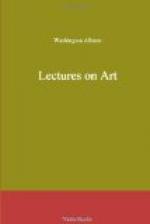Let us turn now to the Apollo called Belvedere. In this supernal being, the human form seems to have been assumed as if to make visible the harmonious confluence of the pure ideas of grace, fleetness, and majesty; nor do we think it too fanciful to add celestial splendor; for such, in effect, are the thoughts which crowd, or rather rush, into the mind on first beholding it. Who that saw it in what may be called the place of its glory, the Gallery of Napoleon, ever thought of it as a man, much less as a statue; but did not feel rather as if the vision before him were of another world,—of one who had just lighted on the earth, and with a step so ethereal, that the next instant he would vault into the air? If I may be permitted to recall the impression which it made on myself, I know not that I could better describe it than as a sudden intellectual flash, filling the whole mind with light,—and light in motion. It seemed to the mind what the first sight of the sun is to the senses, as it emerges from the ocean; when from a point of light the whole orb at once appears to bound from the waters, and to dart its rays, as by a visible explosion, through the profound of space. But, as the deified Sun, how completely is the conception verified in the thoughts that follow the effulgent original and its marble counterpart! Perennial youth, perennial brightness, follow them both. Who can imagine the old age of the sun? As soon may we think of an old Apollo. Now all this may be ascribed to the imagination of the beholder. Granted,—yet will it not thus be explained away. For that is the very faculty addressed by every work of Genius,—whose nature is suggestive; and only when it excites to or awakens congenial thoughts and emotions, filling the imagination with corresponding images, does it attain its proper end. The false and the commonplace can never do this.
It were easy to multiply similar examples; the bare mention of a single name in modern art might conjure up a host,—the name of Michael Angelo, the mighty sovereign of the Ideal, than whom no one ever trod so near, yet so securely, the dizzy brink of the Impossible.
Of Unity, the fourth and last characteristic, we shall say but little; for we know in truth little or nothing of the law which governs it: indeed, all that we know but amounts to this,—that, wherever existing, it presents to the mind the Idea of a Whole,—which is itself a mystery. For what answer can we give to the question, What is a Whole? If we reply, That which has neither more nor less than it ought to have, we do not advance a step towards a definite notion; for the rule (if there be one) is yet undiscovered, by which to measure either the too much or the too little. Nevertheless, incomprehensible as it certainly is, it is what the mind will not dispense with in a work of Art; nay, it will not concede even a right to the name to any production where this is wanting. Nor is it a sound objection, that we




